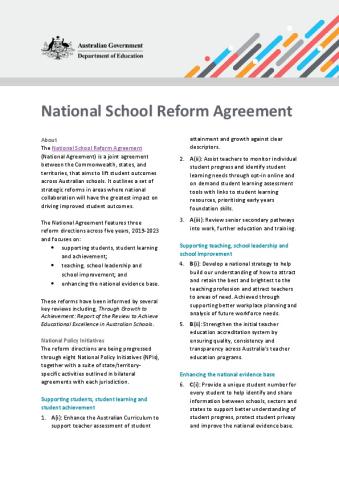About
The National School Reform Agreement (National Agreement) is a joint agreement between the Australian Government, states, and territories, that aims to lift student outcomes across Australian schools. It outlines a set of strategic reforms in areas where national collaboration will have the greatest impact on driving improved student outcomes.
The National Agreement features three reform directions:
- supporting students, student learning and achievement;
- teaching, school leadership and school improvement; and
- enhancing the national evidence base.
These reforms are based on what works and have been informed by several key reviews including, Through Growth to Achievement: Report of the Review to Achieve Educational Excellence in Australian Schools.
National Policy Initiatives
The reform directions are being progressed through eight National Policy Initiatives (NPIs), together with a suite of state/territory-specific activities outlined in bilateral agreements with each jurisdiction.
Supporting students, student learning and student achievement
- A(i): Enhance the Australian Curriculum to support teacher assessment of student attainment and growth against clear descriptors.
- A(ii): Assist teachers to monitor individual student progress and identify student learning needs through opt-in online and on demand student learning assessment tools with links to student learning resources, prioritising early years foundation skills.
- A(iii): Review senior secondary pathways into work, further education and training.
Supporting teaching, school leadership and school improvement
- B(i): Develop a national strategy to help build our understanding of how to attract and retain the best and brightest to the teaching profession and attract teachers to areas of need. Achieved through supporting better workplace planning and analysis of future workforce needs
- B(ii): Strengthen the initial teacher education accreditation system by ensuring quality, consistency and transparency across Australia’s teacher education programs.
Enhancing the national evidence base
- C(i): Provide a unique student number for every student to help identify and share information between schools, sectors and states to support better understanding of student progress, protect student privacy and improve the national evidence base.
- C(ii): Establish an independent national evidence institute to inform teacher practice, system improvement and policy development.
- C(iii): Improve national data quality, consistency and collection to improve the national evidence base and inform policy development.
Bilateral Agreements
Under the National Agreement, states and territories are required to have a bilateral agreement with the Australian Government that sets out state-specific actions to improve student outcomes. Bilateral agreements include activities that support particular student cohorts such as Aboriginal and Torres Strait Islander students, students in regional, rural and remote areas, students with disability and students from a low-SES background.
Annual reports set out state and territory progress in implementing reform initiatives against agreed milestones as detailed in their bilateral agreement for the purpose of assessing compliance with section 22(2)(c) of the Act.
The bilateral agreements and annual progress reports are published on the department’s website.
Alice Springs (Mparntwe) Education Declaration
On 12 December 2019, Australia’s Education Ministers renewed their commitment to national educational goals and actions for the coming decade through the Alice Springs (Mparntwe) Education Declaration (the Mparntwe Declaration).
Under the Mparntwe Declaration, Australia’s Education Ministers agreed to the following goals:
- that education should continue to promote excellence and equity, and
- that all young Australians become confident and creative individuals, successful learners, and active and informed community members.
The goals reflect the changing nature of education, the economy and work. They set out the knowledge and skills required for the 21st century, the importance of learning throughout life from early childhood onwards, and the need for effective transitions between all stages of learning.
The NPIs are mechanisms that deliver the vision of the Mparntwe Declaration for ‘a world class education system that encourages and supports every student to be the very best they can be no matter where they live or what kind of learning challenges they may face.’
Delivery
Education Ministers maintain oversight of progress of the NPIs. The Australian Government, states and territories, and the national agencies, each work collaboratively and/or lead, delivery of the NPIs.
Project milestones
An annual report outlines Education Ministers’ progress in implementing the NPIs against agreed milestones, as detailed in Schedule B of the National Agreement.
The 2019, 2020 and 2021 Annual Reports on progress in implementing the national policy initiatives are published on the department’s website.
Productivity Commission Report
Under the terms of the current National Agreement, an independent review to assess the effectiveness of the NPIs was required to be completed by 31 December 2022 for consideration by Education Ministers and to inform development of a new National Agreement.
On 4 February 2022, Education Ministers agreed to the Productivity Commission undertaking a review of the National Agreement. The final report was publicly released on 20 January 2023.
The Study Report is now available.
National Agreement extension and review to inform the next Better and Fairer Schools Agreement
In December 2022, Education Ministers agreed to establish an Expert Panel to inform the next National School Reform Agreement.
On 29 March 2023, the Hon Jason Clare MP, Minister for Education, announced the members of the Expert Panel that will provide advice on the key targets and specific reforms that should be tied to funding in the next agreement.
The Expert Panel, chaired by Dr Lisa O’Brien AM, published their report in December 2023.
More information about the review and other Expert Panel members.
National Agreement expiry and the Better and Fairer Schools Agreement
The National Agreement will expire on 31 December 2024 and will be replaced by the Better and Fairer Schools Agreement, which will commence on 1 January 2025.
The Better and Fairer Schools Agreement is a 10-year Agreement which will help create a better and fairer education system for all students and put every public school on a path to 100 per cent of the Schooling Resource Standard (SRS).
More information about the Better and Fairer Schools Agreement
National School Reform Agreement Fact Sheet
This fact sheet provides an overview of the National School Reform Agreement.

